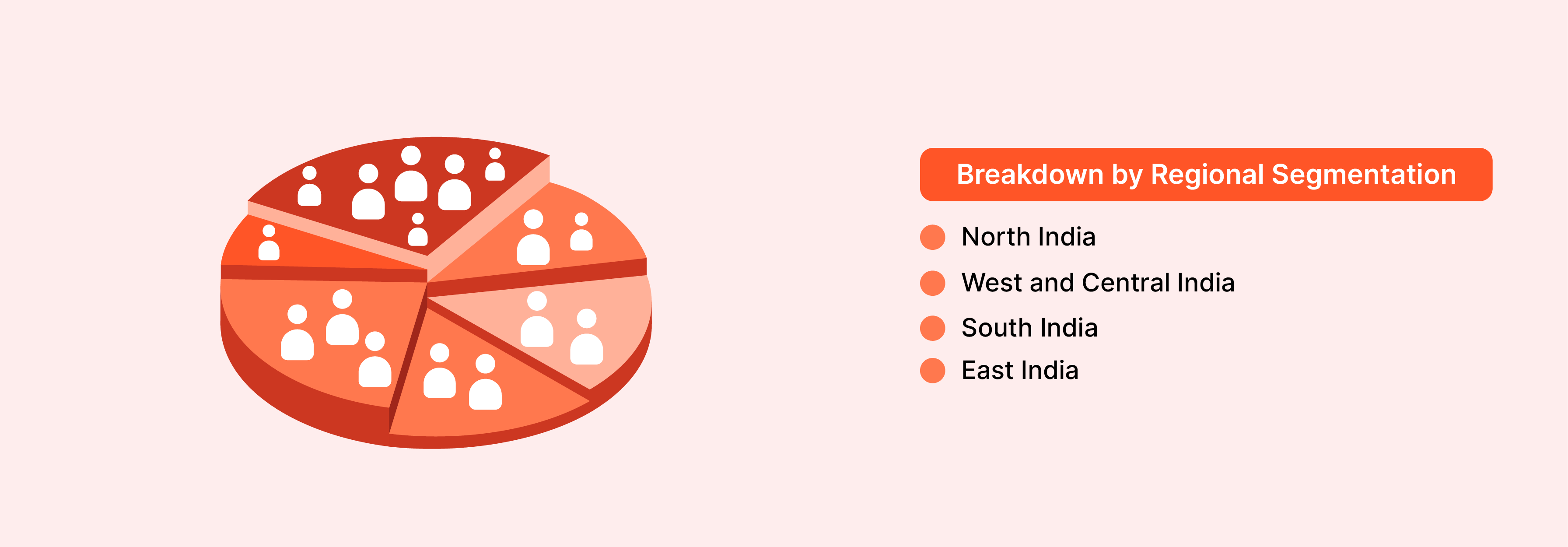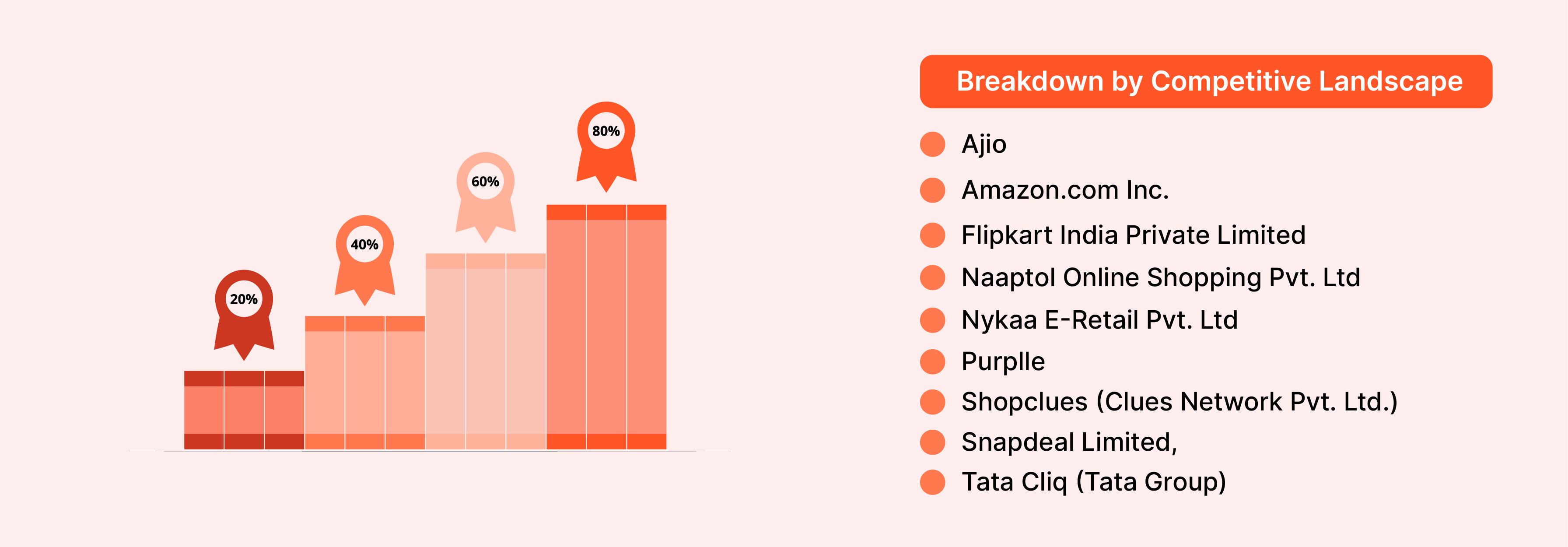
Magento Hosting In India: Industry Segmentation
Magento hosting in India is the 7th largest market for eCommerce, with a predicted revenue of US$104,931.8 million by 2024. Hosting solutions ensure that Magento stores in India operate with high uptime, optimal performance, and security. This guide will cover the industry segmentation of Magento hosting in India based on type, transaction, region, and landscape.
Key Takeaways
-
Discover the significance of Magento hosting in India for an optimized e-commerce platform.
-
Explore the different Magento hosting options available in India according to your business needs.
-
Learn how the segmentation of the Indian e-commerce industry influences the choice of Magento hosting solutions.
-
Evaluate the considerations for choosing the best Magento hosting in India.
-
Explore case studies highlighting top Magento stores in India.
What is Magento Hosting In India?
Out of 80+ countries and territories, the vast majority of Magento partners come from five nations: the US (413), India (241), the UK (129), Germany (86), and the Netherlands (79). This statistic highlights India's significant role in the global Magento community. It also signifies the importance of Magento hosting services within the country.
A key feature of Magento hosting is its focus on providing a robust platform that supports online businesses' scalability and security requirements. It includes using high-performance servers in India, which is essential for managing the heavy resource demands of Magento stores. Magento hosting plans in India often guarantee 99.9% uptime, ensuring that ecommerce sites remain accessible to customers with minimal website downtime.
Experienced hosting providers and the use of the latest technologies ensure Indian Magento hosting services empower online businesses to thrive in a competitive digital marketplace.
Different Magento Hosting Options in India
1. Cloud Hosting
Among the hosting solutions, cloud hosting stands out for its scalability and flexibility, making it highly beneficial for the Indian market. It allows Magento stores to adjust resources dynamically, ensuring seamless performance during traffic surges.
These surges are common during festive seasons and sale events. Cloud platforms like AWS provide an infrastructure that supports fast loading times and high uptime, essentials for maintaining customer satisfaction and loyalty.
2. Managed Magento Hosting
For businesses focusing on growth without the technical hassle, managed Magento hosting offers a comprehensive solution. This hosting plan includes all necessary technical management the provider handles, such as updates, security, and performance optimization.
With features like proactive monitoring and 24x7 support, businesses can ensure their Magento store remains operational, secure, and efficient. It allows them to concentrate on strategic business activities.
3. Dedicated Hosting
Dedicated hosting provides the best performance for Magento stores with high traffic volumes and custom requirements. It offers exclusive server use, ensuring high uptime, fast loading times, and security.
While it comes at a higher cost, the investment is justified by the superior control and customization options available. It is suitable for large ecommerce operations in India.
4. VPS Hosting
VPS hosting balances performance, security, and cost. It provides dedicated resources on a shared server, offering better performance than shared hosting without the cost of a dedicated server.
This option is ideal for medium-sized Magento stores looking to upgrade their hosting environment in India.
5. Shared Hosting
The most cost-effective option is shared hosting, suitable for new or small Magento stores with limited budgets. While it provides the basic hosting needs, its performance and security capabilities are limited due to the shared resources among multiple websites.
Indian E-commerce Industry Segmentation
1. Breakdown by Product Type

The Indian e-commerce market, as detailed in recent reports, is segmented based on product type, highlighting the diverse range of products available to consumers. This segmentation includes:
- Home Appliances.
- Apparel, Footwear, and Accessories.
- Books
- Cosmetics.
- Groceries.
- Others.
Home Appliances lead the market, fueled by the rising middle-class population with higher disposable incomes. The demand for comfort and convenience at home drives this segment's growth. Factors contributing include:
- Wide Selection: Online platforms offer various brands and products, simplifying the comparison and purchase process.
- Affordability: Frequent discounts and deals make high-end appliances more accessible.
- Consumer Confidence: Policies for easy returns and replacements enhance buyer trust.
- Digital Access: Improved internet penetration allows consumers from various regions, including Tier II and Tier III cities, to shop online.
2. Breakdown by Transaction Type

The segmentation based on the type of transaction within the Indian e-commerce market reveals diverse shopping and selling dynamics. The primary categories include:
- Business to Business (B2B).
- Business to Consumer (B2C).
- Consumer to Consumer (C2C).
- Others.
Business-to-consumer (B2C) leads the market, driven by several key factors:
- Widespread Internet and Smartphone Use: Increases the ease of shopping online, allowing consumers to buy products anytime, anywhere.
- Growing Middle-Class: With more disposable income, a higher demand for various products and competitive pricing exists.
- Wide Product Range: B2C platforms offer numerous products from different brands at lower prices, thanks to direct sales to consumers.
- Shift to Online Shopping: The recent preference for contactless transactions, accelerated by pandemic-related restrictions, has boosted online shopping.
- Digital Payments: The increasing use of secure and convenient digital payment methods has facilitated smoother transactions on B2C platforms.
3. Breakdown by Regional Segmentation

The distribution of e-commerce market share across different regions in India showcases distinct patterns of online shopping behavior. The primary regions include:
- North India
- West and Central India
- South India
- East India
West and Central India regions lead in e-commerce market share, attributed to several factors:
- Urban Centers: Houses major cities with high internet and smartphone penetration.
- Purchasing Power: High disposable incomes in these areas contribute significantly to online sales.
- Digital Literacy: Residents are well-versed in using e-commerce platforms, boosting online shopping.
- Infrastructure and Logistics: Developed infrastructure and robust logistics support efficient deliveries.
- Warehousing: Numerous warehouses and fulfillment centers facilitate quick order dispatch and delivery.
4. Breakdown by Competitive Landscape

- Ajio
-
Amazon.comInc. - Flipkart India Private Limited
- Naaptol Online Shopping Pvt. Ltd
- Nykaa E-Retail Pvt. Ltd
- Purplle
- Shopclues (Clues Network Pvt. Ltd.)
- Snapdeal Limited,
- Tata Cliq (Tata Group)
Strategies used by these major ecommerce companies include:
- User-Friendly Technology: Major companies are enhancing their websites and apps to be more user-friendly. They are incorporating advanced security features and personalized interfaces.
- AI and ML Integration: Artificial intelligence (AI) and machine learning (ML) are used for personalized product recommendations. It helps streamline navigation and improve customer service.
- Consumer Trust Policies: Easy return, refund, and replacement policies are in place to build consumer trust and maintain strong customer relationships.
- Logistics and Delivery: Investments in logistics and delivery capabilities aim to increase efficiency. They also help extend reach, including remote areas, and introduce same-day delivery options.
Considerations for Choosing the Best Magento Hosting in India
-
Performance and Reliability: Look for hosting providers offering high uptime guarantees, typically 99.9%, to ensure your website remains accessible. High-performance servers and fast loading times are critical for a smooth shopping experience.
-
Security Measures: Security features, including SSL certificates, firewalls, and regular security updates, are essential to protect your site and customer data. A hosting provider that prioritizes security can help build customer trust.
-
Scalability: Your hosting plan should accommodate your business growth. Cloud hosting platforms are known for their Magento scalability, allowing you to adjust resources easily as traffic increases.
-
Expertise and Support: Choose a hosting provider in India with expertise in Magento. Look for services offering 24x7 support, proactive monitoring, and Magento-specific optimizations. It ensures any issues are quickly resolved, minimizing downtime.
-
Magento-Specific Features: Some hosting plans come with Magento pre-installed, which can simplify the setup process. Features like built-in cache, Redis, and finely tuned database management can significantly improve your site’s performance.
-
Developer-Friendly Tools: If you have a development team, consider hosting services that offer developer-friendly tools and environments. It includes staging areas and easy version control.
-
Integrated Technologies: Look for hosting solutions that use the latest technologies. It includes SSD storage, CDN for improved global loading times, and advanced caching mechanisms to enhance site speed.
-
Location of Servers: Opt for hosting services with servers in India or nearby locations to reduce latency and improve site speed for your local customers.
-
Customization and Flexibility: Your hosting service should offer the flexibility to customize your server setup and hosting environment. It should be according to your Magento store's specific needs.
-
Pricing and Value: Evaluate the cost of hosting plans against the features and services provided. Consider the long-term value, focusing on balancing cost-efficiency and the benefits to your Magento store.
Case Studies: Top Magento Stores in India
According to recent reports, the following are the top Magento stores in India:
1. Malabar Gold & Diamonds
Malabar Gold & Diamonds is one of the largest jewelry retailers in India, with over 260 stores across the globe. They leveraged Magento to build a seamless omnichannel experience for their customers.
How They Leveraged Magento:
- Implemented Magento Commerce for B2C and B2B models.
- Integrated stores, websites, mobile apps, and call centers into one platform.
- Enabled click & collect, endless aisles, and store capabilities.
2. Park+
Park+ provides contactless parking solutions using IoT and automation technology. They used Magento to launch their platform and rapidly scale across different cities.
How They Leveraged Magento:
- Launched MVP marketplace within 3 months.
- Added advanced features like promotions and loyalty programs.
- Integrated with payment gateways and IoT infrastructure.
3. Vakil Search
Vakil Search is India’s largest legal services marketplace connecting clients with lawyers. Magento enabled them to match customers with relevant lawyers based on expertise.
How They Leveraged Magento:
- Built lawyer profiles and expertise filters.
- Integrated video KYC and online payments.
- Added features like case tracking and document management.
4. Pothys
Pothys is a renowned Indian textile retail brand. They moved to Magento to modernize their decades-old retail business for the digital age.
How They Leveraged Magento:
- Redesigned store in line with brand legacy.
- Leveraged native catalog management capabilities.
- Implemented omni-channel features.
FAQs
1. What advantages does Magento web hosting bring to my eCommerce business in India?
Magento web hosting empowers your eCommerce business by providing scalability and robust security. Optimized servers, efficient hosting experience, and finely-tuned security measures ensure your online store operates seamlessly, enhancing the overall customer experience.
2. How does Magento hosting cater to the needs of developers?
Magento hosting companies often offer developer-friendly tools and environments, including staging areas and easy version control. It ensures that developers can efficiently work on Magento-based projects. It optimizes your business website's Magento performance and functionality in India.
3. Can I optimize the server setup for my Magento store's specific needs?
Yes, efficient hosting solutions allow customization and flexibility in server setup, ensuring your Magento store can be tailored to its specific requirements. It includes features like SSD storage, CDN for global loading times, and advanced caching mechanisms for improved site speed.
4. Are Magento installations pre-installed with hosting services in India?
Some hosting plans in India offer Magento pre-installed, streamlining the setup process for your eCommerce business. It ensures a fast Magento installation, allowing you to focus on building a customer-centric online store without the hassle of manual installation.
5. How do web hosting companies contribute to a secure online shopping experience?
Web hosting companies in India prioritize security measures, including SSL certificates, firewalls, and regular security updates. It protects your online store and customer data, building trust and confidence among your clientele.
6. Do Magento hosting services In India offer free extensions?
Yes, many Magento hosting services offer free Magento extensions that can be seamlessly integrated into your online store. These extensions enhance the functionality of your eCommerce business. They provide additional features to optimize the overall customer experience.
7. How does cloud hosting empower Magento stores during peak traffic periods in India?
Cloud hosting, a popular option for Magento stores in India, ensures scalability and flexibility. It proves beneficial during peak traffic periods, such as festive seasons, by allowing dynamic resource adjustments. Platforms like AWS offer infrastructure that supports fast loading times, contributing to high customer satisfaction and loyalty.
Summary
Magento hosting services in India go beyond just server infrastructure setup. Providers offer comprehensive support and scalability, ensuring businesses can focus on their core operations. We covered the industry segmentation of Magento hosting in India. It is based on product types, transaction dynamics, regional patterns, and the competitive landscape. It also covered factors to choose the best Magento hosting and top Magento stores in India.
Explore advanced Magento server hosting options to empower your online business in India.


